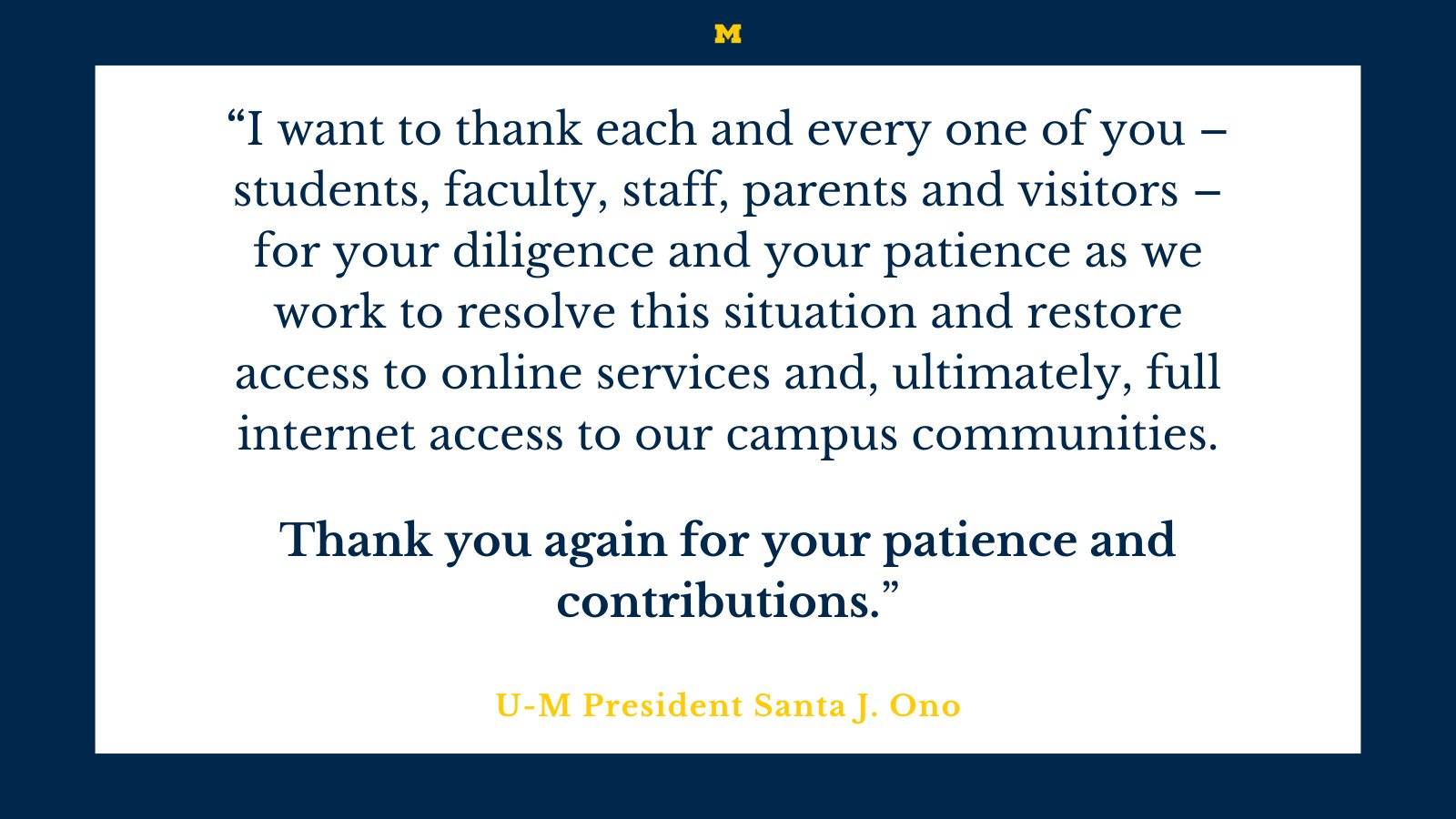The University of Michigan has taken the step of shutting down all its network systems and services in response to a major cybersecurity incident. The University of Michigan cyber attack led to substantial disruptions in the institution’s IT infrastructure, causing interruptions in critical online facilities.
While the University’s IT team is working to restore the affected systems, the administration has proactively disconnected the University’s network from the internet as a precautionary measure, given the severity of the situation.
The University of Michigan released a notice to alert about a security incident experienced by the campus. At present, the University of Michigan cyber attack has not been claimed by any hacking group.
University of Michigan Cyber Attack
An announcement made by the University of Michigan on August 27 revealed the occurrence of a ‘temporary internet outage’ affecting all U-M campuses. The outage was noted to have taken place around 1:45 P.M. on Sunday, August 27.
The University of Michigan internet outage announcement was updated throughout the day. One such alert said that the internet connectivity will be intermittent or unavailable on the U-M Ann Arbor, Flint, and Dearborn campuses from August 27.
On the same day, an update was posted at 6.30 in the evening. The University of Michigan cyber attack update read, “Due to a technology issue, U-M online services remain inaccessible at the moment, including Google, Canvas, Wolverine Access, and email.”
The institution was still working on restoration efforts of the systems on affected campuses. While the next update was due at 9:00 P.M. ET, it was updated at 9:50 the same day. No changes were seen to the updates except for the one published on August 28.
The statement also indicated that the University had taken the step of isolating the U-M network from the internet. This decision was made to facilitate the efforts of the Internet Assurance Team, working alongside prominent cybersecurity service providers, in addressing and mitigating the issue.
“We recognize that cutting off online services to our campus community on the eve of a new academic year is stressful and a major inconvenience,” read another update.
Although the university authorities confirmed the IT teams were detecting a steady stream of malicious actors every hour, they did mention that it would be days before the systems were restored to their full capacity.
Furthermore, they assured that the clinical applications at Michigan Medicine were functional with no patient care being disrupted due to the University of Michigan internet outage. “Campus remains open. Residence halls, dining facilities, classroom buildings, and all university offices are operational,” an update added.
The IT outage at the University of Michigan has left some students astray as the new academic year begins with new registrations which halted due to the security issue. Individual units were said to be making decisions about where to host the classes between on-campus and online options.
The U-M IT outage has also affected student attendance with them not feeling sure of classes and registrations. It also halted services related to financial aid refunds including the campus WiFi, cloud services and Google services.
However, the university assured them of consideration based on the current situation. Students would not be charged late registration or disenrollment feed through August, the authorities declared.
The August 29 update about he U-M IT security breach shared that students, faculty, and staff could now authenticate themselves into the U-M accounts. The campus WiFi was also restored by their IT team along with the cybersecurity experts.
All social media handles run by the University of Michigan were carrying the IT outage alerts for the convenience of users.

The President of the University of Michigan, Santa J. Ono posted the above photo on Twitter thanking the students, faculty, staff, parents, and visitors for their patience throughout the IT outage.
Recently, Michigan State University announced being impacted by the MOVEit cyber attack. They suffered a cyber attack due to a third-party that offered services to the university.
Media Disclaimer: This report is based on internal and external research obtained through various means. The information provided is for reference purposes only, and users bear full responsibility for their reliance on it. The Cyber Express assumes no liability for the accuracy or consequences of using this information.




